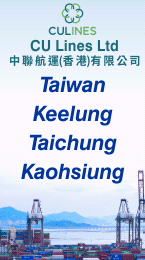|
Today's e-news sponsored by :
|
|
Powered by HKSG GROUP
|
|

|
|

|
|
The Leading Maritime & Transport News Portal
|
Monday, December 30, 2024
|

(Click on the above banner to know more)
|
|
|
|
|
|
|
|
Descartes: US imports robust over peak season
DESCARTES Systems Group has released its December Global Shipping Report for logistics and supply chain professionals, reports UK's Post & Parcel.
In November, US container import volume fell five per cent compared to October, a decline consistent with typical seasonal month-to-month reductions.
However, this drop was smaller than the nine per cent decrease observed in November 2023.
Imports from China also saw a decline, though November's volume was 13.3 per cent higher than the same month in 2023, highlighting the continued strength of US-China trade relations.
Descartes' December update on logistics metrics confirms robust container import performance in 2024.
Still, potential challenges loom, including the possible introduction of new tariffs by the incoming Trump administration, unresolved ILA/USMX contract negotiations, and ongoing geopolitical tensions in the Middle East, which could put strain on global supply chains for the remainder of the year.
"November has traditionally been a softer month than October; however, compared to the past six years, this year's month-over-month decline is the smallest by volume," said Descartes director Jackson Wood.
"While front-loading shipments due to heightened uncertainty around labour unrest and tariffs is a possibility, US container import volumes have been exceptionally strong over peak season this year and, overall, robust throughout 2024."

|
|
Trans-Caspian international route sets new record
CARGO flows along the Trans-Caspian International Transport Route (TITR), or the Middle Corridor, have jumped to a new record high in January-November 2024, reports Baku's Caspian News.
In the first 11 months of 2024, freight volumes surged 63 per cent to 4.1 million tons as container throughput increased 2.6-fold to 50,500 TEU.
The new record was bolstered by continual growth in the overall cargo and container transportation volumes, which currently stands at six million tons and 100,000 TEU a year.
In addition, the TITR Coordination Center was launched in June this year with the aim to enhance infrastructure and broaden the functionality of the route. The new platform seeks to boost the competitiveness of TITR by reducing transit times between Europe and Asia to just 15 days.
The platform involves active participation from key nations and companies, including Kazakhstan, Azerbaijan, Georgia, Turkey and China, among others. It aims to support project development along TITR by fostering collaboration among stakeholders. Its overarching goal is to transform the corridor into a sustainable, competitive, and efficient transport route.
Henrik Hololei, adviser at the European Commission's Directorate-General for International Partnerships, highlighted the Middle Corridor as a flagship of the EU's Global Gateway strategy, aimed at enhancing Europe's connections globally.
"The aim of the platform is to provide a permanent framework that will drive forward the implementation of projects in Central Asia in a consistent and coordinated way to achieve the long-term objective of making the Trans-Caspian corridor a more sustainable, safer and faster route linking Europe and Central Asia in less than 15 days," said Mr Hololei.
Additionally, the platform is designed to assist investors and stakeholders in securing the financial resources necessary to complete key projects along the corridor, including EUR18.5 billion (US$19.9 billion) estimated by the European Bank for Reconstruction and Development.
The Middle Corridor spans approximately 4,250 kilometres of railway and 500 kilometres of sea routes. Its primary goal is to facilitate access for Chinese and Central Asian goods to European markets via the Caspian Sea, Azerbaijan, Georgia, Turkey and the Black Sea.
Beyond its efficiency, the Middle Corridor benefits from favourable climatic conditions, reducing travel time by 15 days compared to traditional sea routes.
It also presents significant opportunities for cargo movement across Asia, enabling goods to reach the Middle East, North Africa, and the Mediterranean region through integrated port connections in Turkey.
Azerbaijan, China, and Kazakhstan have signed an agreement to establish an intermodal cargo terminal at the Port of Alat in Baku along the Middle Corridor.
This initiative aims to enhance the port's cargo-handling capabilities and boost container train traffic along the China-Europe-China route via the Middle Corridor.
According to Kazakhstan Railways, the new terminal will include a multi-purpose cargo yard, a 5,000-square-metre indoor warehouse, and a container yard capable of handling over 1,000 containers.
Azerbaijan is set to receive 300th block train on the Middle Corridor from China via Kazakhstan this year. The goal for 2025 is to achieve 1,000 block train journeys.
Moreover, on November 24, the first block train of 62 FEU containers was dispatched from Azerbaijan to China, underscoring the efforts to transform TITR into an East-West-East route.

|
|
Adriatic box shop installs white noise alarms
ICTSI has announced that AGCT has "taken a big step towards more community-friendly operations by installing white noise reversing alarms on two of its rail-mounted gantry cranes (RMG)," reports Rotterdam's WorldCargo News.
The RMGs were fitted with this technology because of their proximity to residential areas.
White noise reversing alarms emit a softer, more localised sound resembling a gentle hiss rather than the high-pitched beeps of traditional alarms. This directional sound focuses on the immediate area around the crane, reducing noise spill over beyond the terminal.
Additionally, the alarms automatically adjust their volume based on the time of day and surrounding noise levels, ensuring quieter operation at night. This flexibility minimises disturbances for nearby residents while maintaining safety standards in the terminal, said ICTSI.
"The installation of white noise alarms also bolsters safety by providing a continuous, easily locatable sound, enabling workers and pedestrians to identify moving equipment more effectively, even in low-visibility situations. By adopting this innovative technology, AGCT sets a strong example of environmental responsibility," ICTSI said.
ICTSI notes that the white noise alarms help AGCT reaffirm "its dedication to balancing operational efficiency and safety with community well-being, fostering a sustainable and respectful relationship with its surrounding neighbourhood.

|
|
SIFC revives 1,100-TEU project at Karachi
THE Special Investment Facilitation Council (SIFC) has revived the 1,100-TEU containership project, reports Karachi's Express Tribune.
The initiative will see Karachi Shipyard construct Pakistan's first large commercial vessel.
The project is being executed with the cooperation of the Pakistan Navy, Karachi Shipyard, and the Pakistan National Shipping Corporation (PNSC).
The shipbuilding contract, valued at US$24.75 million, is expected to provide an opportunity to construct the vessel at a lower cost compared to international market rates.
This project is viewed as a key step in reducing Pakistan's reliance on foreign shipping companies and promoting economic self-sufficiency.
In addition to potential foreign exchange savings, the project is expected to strengthen Pakistan's maritime industry and contribute to the development of the country's "blue economy."

|
|
Tardy ships disrupt operations in Euro ports
SHIP delays across northern Europe, driven by adverse weather and increased demand, are causing bottlenecks at ports and inland logistics hubs, reports New York's Journal of Commerce.
Carriers and forwarders report that vessels are missing berthing windows due to storms in Europe, typhoons in Asia, and extended voyages around southern Africa. This has forced terminals to adopt a "first come, first served" policy.
Hapag-Lloyd noted that foggy conditions, crane replacements, and residual effects from a US longshore strike in October compound delays at Hamburg's Container Terminal Altenwerder.
Similarly, ports in Rotterdam and Antwerp are experiencing average vessel delays of 1.4 and 1.3 days, respectively, with minimal capacity for flexibility.
Despite these challenges, demand remains strong. North European imports from China in October surged 23 per cent year-on-year, totalling 725,744 TEU, according to Container Trade Statistics. However, schedule reliability is deteriorating, with October's on-time performance for Asia-Europe shipments dropping to 42.5 per cent, a 22-point decline from last year.
The ongoing rerouting of vessels away from the Suez Canal and alliance restructuring are likely to exacerbate disruptions.
December and January will see blank sailings totalling over 150,000 TEU, reducing available capacity and intensifying congestion.

|
|
China debuts hydrogen-powered containership
CHINA has launched its first hydrogen-powered containership in Jinxing, Zhejiang Province, marking a milestone in green shipping, reports Beijing's Global Times.
The 64.5-metre vessel, powered by two 240 kW hydrogen fuel cell systems, has a capacity of 64 standard containers and a range of 380 kilometres.
The ship's zero-emission design is projected to cut 700 tons of CO? annually. Its hydrogen storage system, holding 550 kg of hydrogen, is the largest for a ship.
The integrated control system, including fuel cells, lithium batteries and propulsion mechanisms, is the first in China's maritime industry.
Set to begin operations in 2025, the vessel will transport cargo between Shape and Iesha ports, forming the nation's first hydrogen-powered inland container transport route.
This innovation reflects China's commitment to sustainable waterway transportation.

|
|
First block train from Tashkent makes for Brazil
A block train, carrying 54 FEU is moving 1,512 tons of urea fertilizer sent by Uzkimyoimpeks 每 Uzbekistan's leading export-import operator in the chemical industry, reports Baku's Caspian News.
The train from the First Dry Port Terminal in Tashkent, Uzbekistan, marking a significant achievement in transcontinental rail and maritime logistics.
The train's route crosses Uzbekistan, Turkmenistan, Azerbaijan, and Georgia, where at the Black Sea port of Poti, the containers will be transferred onto a vessel for the sea phase of the journey to Paranagua Port in Brazil.
A representative of Uzbekistan's First Dry Port Terminal stated that the estimated delivery time for this multimodal route is 60 to 70 days. The overland journey from Uzbekistan to Poti is expected to take 20 days, while the sea voyage to Brazil will last 35 to 45 days.
This landmark shipment highlights the growing connectivity between Central Asia and global markets through the Caspian Sea and the South Caucasus, reinforcing the Middle Corridor's role as a vital trade link for Eurasian and intercontinental transport.
According to the latest data from the State Statistics Agency, Uzbekistan's railway network transported a total of 36.1 million tons of cargo in January-June 2024.
Tashkent has long been aiming for a robust integration into to the Trans-Caspian International Transport Route (TITR), also known as the Middle Corridor, to increase transit cargo volume on a shorter and faster route. The European Union is pinned as the primary market for Uzbek goods. In this vein, Uzbekistan intends to increase cargo transportation on the Middle Corridor to the EU countries through Bulgaria.
However, the authorities of this Central Asian nation have been exerting efforts to diversify target markets by leveraging the Middle Corridor's potential.
Azerbaijan is actively collaborating with Uzbekistan to integrate it into the Middle Corridor. This partnership focuses on improving infrastructure and logistics, including joint ventures in logistics centres and intermodal transport connections between Samarkand and Baku. These initiatives aim to provide Uzbekistan with direct access to the Caspian Sea and European markets through Azerbaijan.
Furthermore, in September, Uzbekistan inked a document on the establishment of the "Eurasian Transport Route" International Association in Baku. The association aims to combine rail capacities of Azerbaijan, Turkey, Uzbekistan, Kyrgyzstan, Turkmenistan, Tajikistan, China and Austria for reviving a southern branch along the Middle Corridor. The recent shipment from Uzbekistan to Brazil could be seen as the first significant realization of this route.
Another significant project is the China-Kyrgyzstan-Uzbekistan railway line, which promises to unlock new logistical routes for Central Asia and a greater region. This corridor will plug countries like Tajikistan, Turkmenistan, and Afghanistan into global markets.

|
|
FedEx mull hub deal linking Africa and India
FEDEX International COO Richard Smith and FedEx President MEISA Kami Viswanathan announced their collaboration with Chennai Super Kings and Johannesburg Super Kings.
FedEx International Chief Operating Officer Richard Smith and FedEx President MEISA Kami Viswanathan announcing the collaboration with champion cricketers Chennai Super Kings and Johannesburg Super Kings, reports Chennai's Hindu daily.
FedEx Express Corporation (FedEx) is exploring the possibility of setting up a state-of-the-art air cargo hub in India, said a top company executive.
"We are exploring the possibility of setting up a hub to connect Indian cities faster with international markets and to act as a sub-regional hub for South Asia and other markets adjacent to the country," said FedEx President MEISA Kami Viswanathan.
In February 2024, the world's largest transportation company opened a hub at the Dubai World Central Airport in Dubai South at an investment of US$350 million. FedEx also has hubs in the US, China and France.
The company is working with the Centre and seeking regulatory changes to make the hub a reality, she said and added that the move would enable transshipment from one country to another without having to spend hours on ground.
FedEx International Chief Operating Officer and FedEx Airline CEO Richard Smith said that India was a fast growing market and occupied the third slot after Vietnam and Mexico. It had the potential to overtake them. "We are aiming to double the volume in 2-3 years," Ms Viswanathan said.
Mr Smith and Ms Viswanathan were in the city to announce a three-year collaboration with Chennai Super Kings in India and Johannesburg Super Kings in South Africa as the principal sponsor and official logistics partner.

|
|
Russia runs Syrian base, but locals man perimeters
A RUSSIAN cargo plane departed from Russia's air base in the Syrian port city of Latakia for Libya on Saturday, a Syrian security official stationed outside the facility said, following rebels' overthrow of President Bashar al-Assad, Reuters reports.
The official told Reuters that additional Russian departures from the Hmeimim air base in Syria's coastal Latakia province were expected in the coming days.
Increased activity has been observed at the air base throughout the day. In addition to the departing cargo plane, an Ilyushin II-76 cargo plane and an Alligator helicopter were seen landing at the base.
Helicopters were also seen flying within the base, and a SU-34 jet landed for refuelling. A Zeppelin hovered overhead, and two trucks carrying Russian flags were seen traveling within the base.
Syrian fighters guard the entrance of Hmeimim air base in Syria's coastal Latakia, Syria. Syrian fighters guard the entrance of Hmeimim air base in Latakia.
On Friday, satellite images showed Russia moving military equipment at Hmeimim air base, with two Antonov AN-124 cargo planes visible.
Russia, a longstanding ally of Assad, granted the ousted Syrian leader asylum last weekend after helping him to flee his country as the rebels approached Damascus.
Moscow has said it hopes to maintain its two bases in Syria - the Hmeimim air base at Latakia and a naval base in Tartous - in order to keep up efforts against what it called international terrorism.
Russian Deputy Foreign Minister Mikhail Bogdanov said on Thursday contacts with the political committee of Syria's Islamist rebel group Hayat Tahrir al-Sham were "proceeding in constructive fashion".

|
|
German States push for aviation tax cuts
GERMANY'S state leaders urge the federal government to lower taxes and fees on the aviation industry to maintain competitiveness, reports Reuters.
High operational costs have caused German airports to lag behind their European counterparts in passenger numbers.
Hesse state chief Boris Rhein emphasized that Germany cannot afford state-imposed disadvantages as airlines increasingly avoid German hubs.
Ryanair recently cut 20 per cent of its traffic at Berlin-Brandenburg Airport due to excessive location fees.
Germany's aviation sector has struggled to recover from recent crises, and stakeholders are calling for immediate reforms to ensure the industry's long-term viability.

|
|
FAA to enforce drug and alcohol testing at repair shops
The US Federal Aviation Administration (FAA) finalized rules requiring foreign aviation repair stations to implement drug and alcohol testing for employees handling safety-critical maintenance for US airlines, reports Reuters.
The regulation, effective by December 2027, impacts nearly 1,000 stations across 65 countries.
FAA administrator Mike Whitaker stated this rule ensures all safety-sensitive employees meet the same high standards, regardless of location.
While some countries, such as China, already enforce strict drug management policies, the testing requirements have raised concerns about compliance with local privacy and labour laws in nations including Germany, Japan, and Brazil.

|
|
|
|
|

|
Copyright 2024 HKSG Group Media Ltd. All rights reserved.
|









